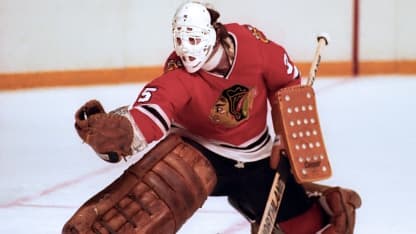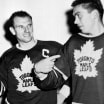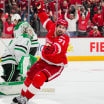Tony Esposito dies at 78, Hockey Hall of Fame goalie
Won 418 games for Black Hawks from 1969-84, had pancreatic cancer

Tony earned a place beside his brother in the Hockey Hall of Fame by winning more than 400 games with the Chicago Black Hawks and having perhaps the greatest season of any rookie goalie in NHL history.
"The Blackhawks and the National Hockey League have lost a legend in Tony Esposito, who passed away today after a brief battle with pancreatic cancer," Blackhawks chairman Rocky Wirtz said in a statement.
Esposito was born in Sault Ste. Marie, Ontario, on April 23, 1943, 14 months after Phil. Unlike his older brother, who took the conventional route of playing junior hockey before coming to the NHL, Tony opted to play college hockey in the United States, playing three seasons at Michigan Tech before signing with the Montreal Canadiens in 1967. The Canadiens brought him to the NHL during the 1968-69 season; he went 5-4 with four ties in 13 games and was a backup on Montreal's fourth Stanley Cup championship team in five seasons.
But in June 1969, the Canadiens had to choose between keeping Esposito or veteran
Gump Worsley
in the intraleague draft. They opted to protect Worsley; the Black Hawks took Esposito and solved their goaltending problems into the 1980s.
Esposito became an instant hit in Chicago by going 38-17 with eight ties, a 2.17 goals-against average and 15 shutouts, still the modern-day single-season record for an NHL goalie. He was voted winner of the Calder Trophy as the NHL rookie of the year, won the Vezina Trophy for helping Chicago allow the fewest goals, and joined Phil, a center with the Boston Bruins, as NHL First-Team All-Stars.
Tony helped the Black Hawks reach the Stanley Cup Final in 1971 and 1973, though they lost to the Canadiens each time.
"The National Hockey League, the Chicago Blackhawks and the city of Chicago lost a beloved member of the hockey family earlier today with the passing of Tony Esposito," NHL Commissioner Gary Bettman said. "From his arrival in the Windy City in the late 1960s through an illustrious playing career and decades as a franchise icon, Tony left an indelible mark -- both on the ice and in the community -- over the next 52 years. Beyond the individual awards -- and there were many, including a Calder Trophy, numerous All-Star and Vezina Trophy recognitions, and ultimately election to the Hockey Hall of Fame -- it was Esposito's style, charisma and heart that endeared him most to hockey fans not only in Chicago but across the NHL. 'Tony O' was a fierce competitor who also took great pride in being an entertainer, whether it was with his pioneering butterfly style during his playing days or interacting with fans across the League as one of this game's great ambassadors.
"The hockey world will miss him greatly. The NHL family extends its deepest sympathies to his wife, Marilyn, sons Mark (Kim) and Jason, and grandchildren Lauren and Kamryn."
Esposito got Chicago to the Stanley Cup Playoffs in each of his first 14 seasons. A three-time Vezina winner (also 1971-72 and 1973-74), he ended his NHL career as a 40-year-old in 1984 with a record of 423-306 with 152 ties, a 2.93 GAA and 76 shutouts, and was inducted into the Hall of Fame in 1988, four years after his brother.
"Tony was a wonderful person who meant the world to Blackhawks fans and the city of Chicago," Blackhawks captain Jonathan Toews said. "He also meant a lot to the players on the team as he was welcoming to us all and taught us how special it was to be a part of this organization. The legacy he left with this franchise will live on forever and we will never forget his accomplishments. On behalf of all my teammates, my condolences go out to the entire Esposito family."
Esposito also played for Canada against the Soviet Union in the 1972 Summit Series.
"I first met Tony Esposito during the well-known 1972 Super Series between the USSR and Canada," Vladislav Tretiak, former goalie and Hockey Hall of Famer said. "Tony participated in four of the eight matches, and we were named the best players of Game 2. He was a strong goalkeeper, who was named the best in the NHL on three occasions. He held his stick with his left hand, and his trademark move was how he laid on his side and dived under the opposing player with his pads. I used the same technique until others got the hang of it.
"Tony was a good, helpful person. ... The last time I saw Tony was eight years ago at the Hall of Fame. All of us in the ice hockey community will miss Tony, and I would like to send my condolences to his loved ones, friends, colleagues, partners and the Canadian people."
Tony was the general manager of the Pittsburgh Penguins for 19 months before being fired in December 1989, then was chief scout of the Tampa Bay Lightning, founded by Phil, from the franchise's NHL debut in 1992 until October 1998. His final drafts included centers
Vincent Lecavalier
and
Brad Richards
, two cornerstones of the Lightning's Stanley Cup-winning team in 2004.
"The entire Tampa Bay Lightning organization is terribly saddened to hear of the passing of Tony Esposito today just weeks after his diagnosis," the Lightning said in a statement. "Tony was a founding, cornerstone member of the Lightning family who was a fixture at games and, along with his brother Phil, played an integral role in laying the groundwork for a successful franchise in the Sunshine State when many thought it was impossible. His role cannot be understated. Tony was a true legend on the ice and off of it. We extend our deepest sympathies to his wife, Marilyn, his family, friends and all of those he touched in the hockey community."
The Blackhawks retired his No. 35 on Nov. 20, 1988, then honored him again on March 19, 2008, by staging "Tony Esposito Night," at which he was named a team ambassador.
"He was tireless, reliable and a great teammate," Wirtz said. "If you were a new player in Chicago, Tony and Marilyn always made you feel welcome and comfortable. Rookies were invited to their home for countless dinners, and when the Espositos held their annual Christmas party, everybody associated with the Blackhawks was there. Everybody, whether you were an established veteran or an awed rookie.
"… It is a sad day for the Blackhawks and all of hockey. But with his wonderful family, let us celebrate a life well lived. Tony Esposito's banner will be part of the United Center forever, as will his legacy as a superstar, on and off the ice."
The Esposito family said in a statement, "To the Blackhawks and the National Hockey League, Tony Esposito was a Hall of Fame goalie. To us, he was a Hall of Fame husband, father, and grandfather. Chicago felt like home from the time Tony first arrived in 1969, thanks to the Wirtz family and those 18,000 Blackhawks fans who treated him like family every night at the Stadium, win or lose or tie. As we mourn Tony's passing, we cherish the memories and the affection, when he was a player and later as an ambassador. We are forever grateful for your support, and we feel blessed now to have your prayers at a difficult time. Tony was a private person, but he felt your love and he loved you back."
Former Black Hawks goalie Darren Pang, who debuted with Chicago the season after Esposito retired, recalled getting to know the player whose style he emulated growing up and attending parties he hosted for goalies and defensemen.
"Never in a million years did ever I think that I'd meet him," said Pang, a commentator on NHL Network and St. Louis Blues television broadcasts. "... I just remember going to his basement. It was in Elmhurst (Illinois), where he had his house. Going down the stairs, hunter green paint, millions of framed black and white and 8-by-10s and 5-by-8 pictures of hockey and pads on the walls, sticks laying around. I remember taking a set of pads off the wall, putting them on my legs and Tony would explain every bit of it.
"I guess to put it in perspective, when you grow up thinking about a player as if they're a god, something you never think you're going to be and meeting the person and finding out the person is as good or better than you thought, that's what leaves a mark. That, to me, is something that's real special."
NHL.com staff writer Tracey Myers and independent correspondent Pavel Lysenkov contributed to this report
We are heartbroken to have lost a legend in Tony Esposito, who passed away today after a brief battle with pancreatic cancer.#TonyO ❤️
— Chicago Blackhawks (@NHLBlackhawks) August 10, 2021

















